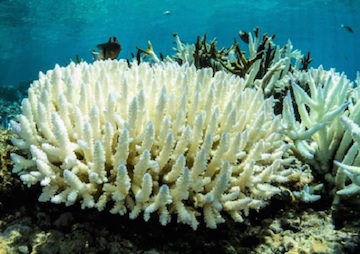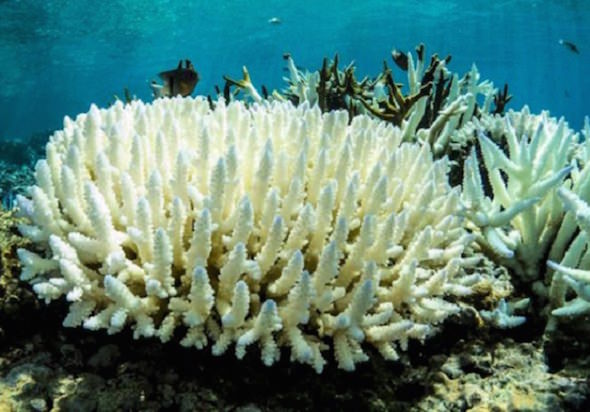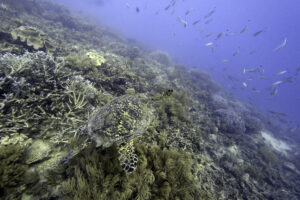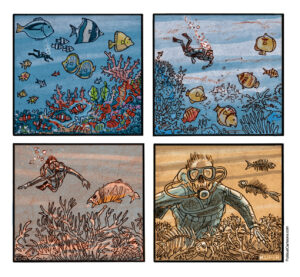Aerosols May Offer Short-Term Lifeline to Corals in Crisis
Reducing the bleaching of corals by blocking the sun’s rays might buy time to keep tropical reefs alive if efforts are increased to halt global warming.
By Tim Radford, Climate News Network

Bleached coral on a reef off the coast of Fiji in the South Pacific. (Peter J. Mumby, University of Queensland)
This Creative Commons-licensed piece first appeared at Climate News Network.
LONDON — A new solution has been proposed for the forthcoming crisis of the coral reefs: blot out some of the sunlight.
Scientists from the US, UK and Australia suggest a form of climate engineering called solar radiation management, which involves pumping aerosols into the stratosphere to reduce global temperatures — and especially the warming of the tropic seas.
If sea temperatures rise just 1°C to 2°C above the normal summer high, something gruesome happens to the coral reefs: they bleach.
This is because they sicken, and expel the colourful algae with which they cohabit. It is a survival technique known to biologists as symbiosis. But if the bleaching goes on for long enough, they die.
Human-induced warming
Lester Kwiatkowski — a researcher with both the University of Exeter in the UK and the Carnegie Institution for Science in the US — and colleagues report in Nature Climate Change that human-induced global warming because of the burning of fossil fuels could raise temperatures enough by 2050 to bleach and degrade 90% of the world’s coral reefs.
So, the authors argue, the world must accept that the loss of the reefs is inevitable — or buy time to save them.
The latter option could be addressed by squirting massive quantities of sulphate aerosols into the stratosphere to reflect radiation and darken the skies, while humans get on with the much-delayed challenge of reducing atmospheric carbon dioxide concentrations by switching to renewable sources of energy.
The irony is that Dr Kwiatkowski has only lately dismissed at least one ocean geoengineering solution — to cool the sea surfaces by pumping up cold water from the ocean depths — because, in the long run, it might make the climate change crisis even worse. Nor is he the only scientist to make that point.
“We need to accept that the loss of a large percentage of the world’s reefs is inevitable,
or start thinking beyond conventional
mitigation of CO2 emissions.”
Geoengineering has repeatedly been defined as the wrong answer to problems of soaring human numbers and uncontrolled economic growth.
So the real message of this latest study may be that the choices facing humankind have become increasingly unwelcome.
Coral reefs are the richest ecosystems in the oceans, and 500 million people depend on the living coral and its co-dependants for food, tourist income and coastal protection.
The tropical reefs have bleached before, in extremes of heat, but after a few years have recovered. Whether they could survive both a sustained rise in temperatures and the increasing acidification of the oceans that goes with higher carbon dioxide levels is another matter.
Ecosystem at risk
So the researchers decided to see what it would take to reduce the risk. They took some account of the impact of the debilitating effect of increasing ocean acidity. Then they considered the hypothetical fate of corals in a warming world.
There is no doubt that bleaching is a consequence of hotter seas, or that by 2100 the entire reef ecosystem will be at risk.
At least one other group has proposed that some form of solar protection could be an answer, but another has suggested that at least some corals might adapt.
“Coral reefs face a dire situation, regardless of how intensively society decarbonises the economy,” says Peter Cox, professor of climate system dynamics at the University of Exeter.
“In reality, there is no direct choice between conventional mitigation and climate engineering, but this study shows that we need to accept that the loss of a large percentage of the world’s reefs is inevitable, or start thinking beyond conventional mitigation of CO2 emissions.”
Your support matters…Independent journalism is under threat and overshadowed by heavily funded mainstream media.
You can help level the playing field. Become a member.
Your tax-deductible contribution keeps us digging beneath the headlines to give you thought-provoking, investigative reporting and analysis that unearths what's really happening- without compromise.
Give today to support our courageous, independent journalists.






You need to be a supporter to comment.
There are currently no responses to this article.
Be the first to respond.